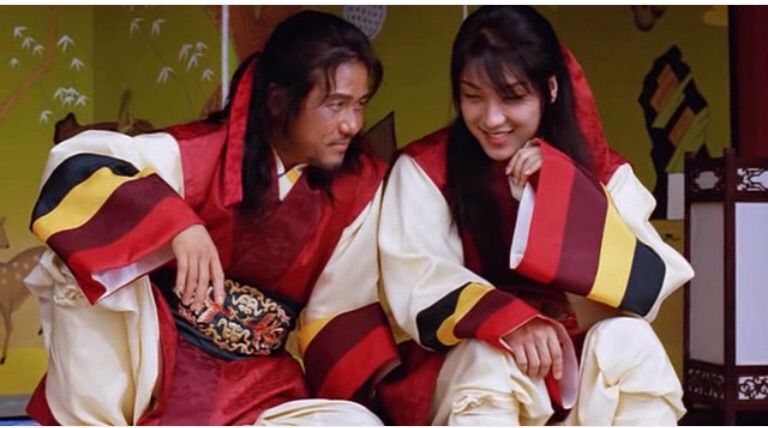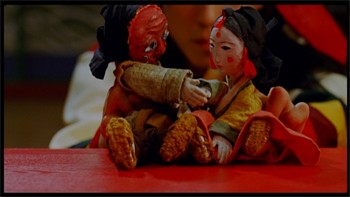
⭐️⭐️⭐️
The 2005 Korean film starring Kim Woo-Sung as Jang-Saeng, Jung Jin-Young as King Yeonsan, and Lee Joon-Gi as Gong-Gil. Also known as “The King’s Man,” directed and produced by Lee Joon-Ik.

Brief summary: Two entertainers move to Hanyang (Seoul) to find their fortune from the crowd, but get arrested for mocking the king. One of the king’s ministers then makes a deal with Jang-Saeng: die for treason or make the king laugh with their humor. But keeping the tyrannical king entertained is going to strain everyone in the performing troupe until there’s no way out.

An honest confession: I watched this one for Lee Joon-Gi. I’m a fan of much of his later work and thought time-traveling would be a new experience. Well, this one was certainly a new experience! Everyone’s participation in this movie is fantastic and it poses an intriguing story, but there are a few things that I would forewarn about:

1. Lee Joon-Gi’s role is pretty pathetic. We could summarize it into two words: EYE CANDY. For real. Not only is he pretty to the audience, but a lot of the story centered around how his androgyny causes problems! And Gong-Gil doesn’t do much else!

2. Because Gong-Gil’s androgyny causes problems, some scenes of this film are surprisingly homosexual. But what else could we expect from the wimpy Gong-Gil?

3. Lots of sexual innuendos, mostly coming from the performing troupe of entertainers. It’s not entirely unexpected though. They’re clowns in Joseon, for crying out loud! Of course they’re going to use whatever they can for their practice.
All that being said, this move is definitely for mature audiences.

But the film has some interesting points, especially about Jang-Saeng and Gong-Gil. Throughout the movie, we tend to wonder if they are brothers, lovers, or just really really close friends. It’s not until Jang-Saeng tells his story of taking blame for a stolen ring, not knowing that Gong-Gil stands watching and listening, and then Gong-Gil finishing the story with puppets that we learn how they first went on the road together.

I do have a favorite line in this movie, though. Since the troupe makes a lot of its laughs off of sexual innuendos, of course they think that this is the problem when they are arrested for misrepresenting royalty. One of them says: “If it’s about the kings ‘equipment,’ he is the King after all, so we thought it ought to be king-sized.” 😂 Aw man, I laughed. I didn’t think I’d see a crossover of theatre, the word “equipment,” and American sizing for beds and candy bars in a historical film!

Another funny thing is that the King is never called by his name in the film, but we all know which king it is. The real King Yeonsan must really have done a number on himself if a foreign Caucasian such as myself can recognize the trademarks of his story without Google.

The tight-rope also seems to have more symbolism than we think. At first, it’s just an act, but it becomes clear that the tight-rope means something more to Jang-Saeng because Gong-Gil stops him from hacking at it with a sword in such a dramatic way. A rope can be replaced, but it must symbolize something else that it would be treasured. I think we get a clear inkling of this near the end, as Jang-Saeng describes the tight-rope walking experience as “there’s nothing on either side but abyss,” which we heard before from Gong-Gil and his puppets. Interesting, huh?

The ending left me with a question. It ends with the historical revolt at the palace in 1506, Jang-Saeng and Gong-Gil on the tight-rope as the palace is seized. But then the final scene is a memory of the nature troupe together, laughing and happy. So what exactly happened? I think the point of the ending like that is that we wonder a bit, but let’s be a little realistic: those suicidal boys probably died.

I don’t know that I would watch this one again for fun, but it seems to have some educational value. In addition as the film that propelled Lee Joon-Gi into the cinematic world (and therefore some of my favorite dramas), it is worth taking a look at. 3/5 stars!
Comments
Post a Comment